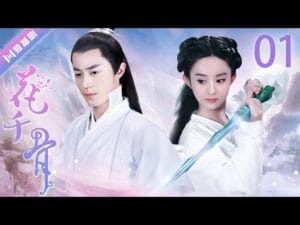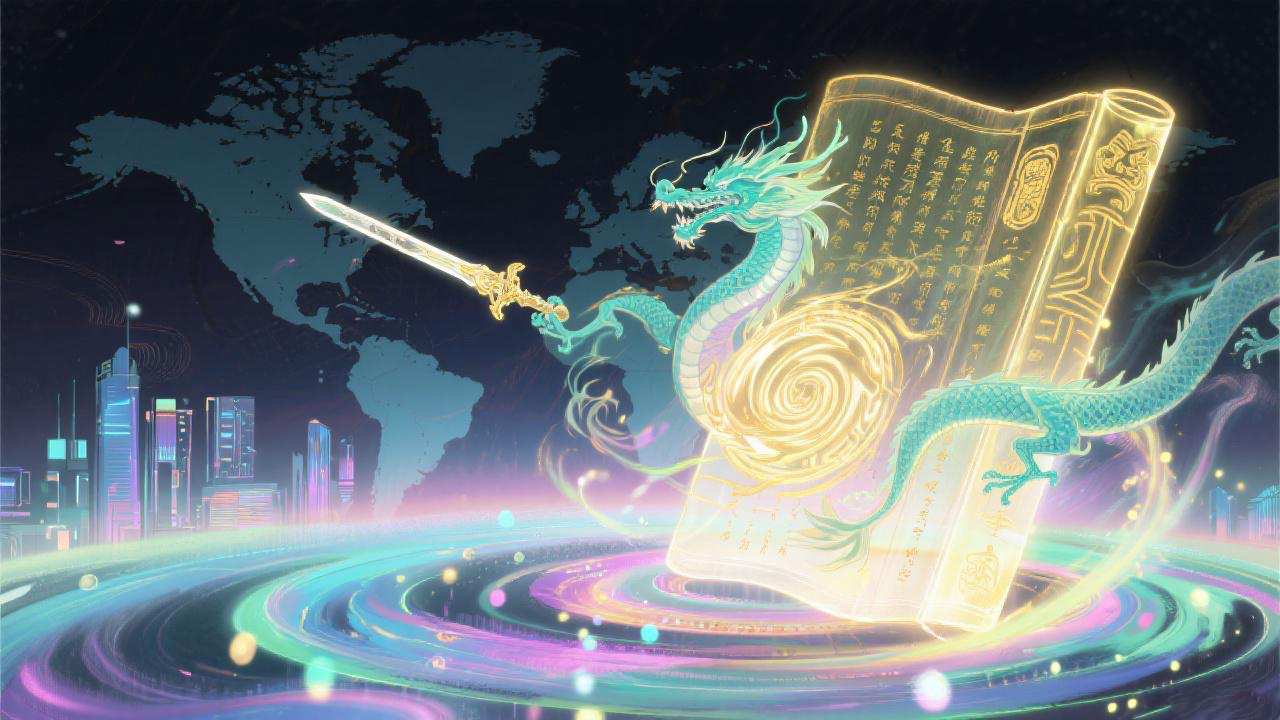Chinese fantasy has transcended its literary origins, becoming a global phenomenon. What began as captivating stories on digital platforms now dominates screens and gaming consoles worldwide. These rich narratives, particularly the Xianxia and Xuanhuan genres, have captivated billions, offering an escape into magnificent, reality-defying worlds.
This article explores the remarkable journey of these stories from their digital beginnings to their successful adaptations in film, animation, and games. We’ll examine the challenges and triumphs involved in transforming beloved narratives into visual spectacles and interactive experiences.

The Rise of Online Novels: The Roots of Chinese Fantasy
Before delving into adaptations, it’s vital to understand the emergence of online novels themselves. Around the turn of the 21st century, with the internet’s proliferation, a quiet revolution began. Writers, free from traditional publishing constraints, started sharing their works on personal websites and forums. This freedom fostered immense creativity, leading to a boom in diverse genres. Among them, Eastern fantasy tales, with their unique elements, intricate plots, and vivid characters, quickly amassed a massive readership.
The explosive growth of these narratives was further fueled by specialized online literature platforms like Qidian Chinese Network, Zongheng Chinese Network, and Jinjiang Literature City. These platforms provided essential channels for authors and convenient access for readers. Crucially, real-time reader feedback and interaction heavily influenced plots and character development, giving this form of storytelling a unique, collaborative quality.
This distinct creative and dissemination model endowed these literary IPs with vast fan bases and immense potential. When these works, with their established worlds and fervent followers, intersected with the film, anime, and gaming industries, a significant cultural shift was inevitable.
From Text to Screen: The Success Secrets of TV Dramas
Adapting a sprawling online novel into a TV series is a monumental task, akin to creating an entirely new universe. Key challenges include prioritizing content, visualizing grand worldviews, and faithfully portraying complex characters and emotions. Yet, many productions have successfully navigated these hurdles, becoming beloved classics.
A truly successful fantasy TV series typically excels in several areas:
- Accurate Grasp of the Original Spirit: This isn’t about rigid replication but capturing the core essence, character arcs, and emotional depth.
- Exquisite Production Quality: Flawless special effects, authentic costumes, props, and set designs are crucial for bringing the fantastical world to life.
- Outstanding Cast: Actors’ understanding and portrayal of their roles are paramount, transforming abstract textual figures into vibrant on-screen presences.
- Judicious Plot Adaptation: Necessary adjustments to pacing, cuts, or additions for the screen must never compromise the story’s inherent charm.
Classic Case Studies:
- The Journey of Flower: This TV series, adapted from Fresh Guoguo’s popular online novel, achieved astonishing viewership ratings. It successfully recreated the heart-wrenching master-disciple romance and showcased impressive special effects, sparking a nationwide viewing frenzy.
- Eternal Love (Three Lives, Three Worlds, Ten Miles of Peach Blossoms): Adapted from Tang Qi Gong Zi’s widely read Xianxia story, this drama became a massive hit. Its beautiful visuals, touching love story, and excellent performances resonated deeply, attracting both original fans and new viewers, demonstrating the immense potential of the genre in modern television. You can explore more Xuanhuan novels that share similar epic scope and romantic themes on our platform.
- Ashes of Love: Also adapted from Dian Xian’s acclaimed online novel, this drama further cemented the genre’s appeal with its exquisite costumes, highly restored sets, and brilliant acting. Its intricate plot and genuine character emotions led to widespread discussion and acclaim.
These successful examples prove that with dedicated production, these narratives can truly shine in film and television, becoming more than mere IP monetization, but also a modern showcase of rich traditional culture and boundless imagination.
A New Chapter in Animation: The Rise of Anime Adaptations
Compared to live-action, animation offers greater freedom in depicting the grand worldviews and extraordinary abilities inherent in fantasy stories. Without actor limitations, animation can vividly portray cultivation, battle qi, and magic, unleashing the full potential of textual imagination.
In recent years, Chinese animation has seen a remarkable rise, leading to a boom in animated adaptations of online novels. From 2D to 3D, and from traditional hand-drawn techniques to advanced CG, the production quality of Chinese animation is rapidly improving, providing an excellent medium for these fantastical narratives.
Classic Case Studies:
- Soul Land: Tang Jia San Shao’s phenomenal online novel found immense success in its animated form. Exquisite 3D modeling, fluid fight scenes, and a plot faithful to the original have made Soul Land a weekly must-watch for countless fans. Its triumph highlights the robust capabilities of Chinese animation and the power of adapting popular digital stories. (Image Suggestion: A dynamic still from the “Soul Land” anime.)
- A Record of a Mortal’s Journey to Immortality: Wang Yu’s realistic cultivation novel, its animation adaptation has also been highly praised. The animation meticulously renders character models, environmental details, and magical effects, faithfully recreating Han Li’s arduous journey to immortality and offering viewers a deeply immersive experience. You can see examples of this high-quality animation on platforms like Crunchyroll.
- Mo Dao Zu Shi (Grandmaster of Demonic Cultivation): Mo Xiang Tong Xiu’s online novel adaptation became a standout in Chinese animation with its beautiful art style, delicate emotional depth, and captivating plot. Its immense popularity both in China and internationally showcases the global appeal of these tales.
The success of these anime adaptations has not only offered a new way for fans of these online novels to experience their beloved stories but also attracted a wider audience previously unfamiliar with online literature. Through animation’s visual language, the intricate worldviews and character images become more vibrant, further expanding their influence.
Immersive Experience: The Charm of Fantasy Games
Beyond film and anime, gaming provides another deep dive into fantastical worlds. By adapting an online novel into a game, players can personally embody characters, experience cultivation, combat, and exploration firsthand, and even influence the story’s direction, gaining an unparalleled sense of immersion.
These games typically span genres like MMORPGs (Massively Multiplayer Online Role-Playing Games), ARPGs (Action Role-Playing Games), and turn-based RPGs. A successful game adaptation not only faithfully recreates the original world and characters but also boasts excellent gameplay design, balanced systems, and smooth performance.
Classic Case Studies:
- Justice Online: While primarily adapted from Wen Rui’an’s wuxia novels, it seamlessly integrates numerous elements of the fantasy genre. Its exquisite graphics and expansive Jianghu world have attracted a vast player base. The game’s high standards in scene design and skill effects make players feel truly immersed in this type of realm. (Image Suggestion: A screenshot from “Justice Online” showcasing its detailed graphics or combat.)
- Jian Wang 3 (JX3 Online): As a classic wuxia MMORPG, though not directly from a single online novel, its deep cultural heritage and vast world resonate with many readers of cultivation stories. Its rich story quests, diverse sects, and varied PvP/PvE gameplay offer enduring appeal. If you enjoy games with rich narratives, consider exploring our Xianxia novels for similar immersive experiences.
- Mobile Game Adaptation Boom: The widespread adoption of mobile internet has led to a surge in mobile game adaptations of these narratives. Titles like Perfect World (adapted from Chen Dong’s novel) and Jade Dynasty Mobile allow players to enjoy the stories in bite-sized sessions through card collection, turn-based combat, or real-time action. While quality varies, many well-produced and engaging titles have successfully drawn in both original fans and mobile gamers.
Game adaptations imbue these IPs with enhanced vitality. They not only satisfy fans’ desire for participation but also, through this interactive medium, disseminate these captivating stories and worldviews to a broader audience.
Challenges and Prospects: The Future of Novel Adaptations
Despite their significant achievements, the adaptation of popular online novels continues to face various challenges.
Challenges:
- Copyright Issues: The increasing value of IP has led to more disputes and irregularities, directly impacting the smooth progression of adaptations.
- Content Selection and Adaptation: Striking a balance between loyalty to the source material and suitability for different mediums remains a perpetual challenge. Excessive fidelity can slow pacing, while over-adaptation risks alienating core fans.
- Production Costs and Cycles: High-quality fantasy productions demand substantial financial investment and lengthy development times, posing significant challenges for production teams.
- Homogeneous Competition: As the volume of adaptations grows, so does the risk of sameness. Differentiating new productions and standing out in a crowded market is a constant hurdle.
Prospects and Predictions:
Despite these challenges, I remain optimistic about the future of Xianxia and Xuanhuan novel adaptations.
Firstly, a clear trend towards high-quality production is irreversible. As audience and player expectations rise, poorly produced works will inevitably be phased out. Future adaptations will prioritize refined scripts, stunning visuals, and innovative gameplay, focusing on “quality” over mere “quantity.” Only genuinely well-crafted works that respect their source material will truly distinguish themselves.
Secondly, technological advancements will revolutionize the experience. With the maturing of AI, virtual reality (VR), and augmented reality (AR) technologies, future adaptations will move beyond traditional film, anime, and games. Imagine truly “immersive experience” games where VR headsets transport players directly into a cultivation world; or AI-assisted content generation for plots, scenes, and characters, boosting efficiency and imaginative visual flair. Interactive dramas and multi-ending games will also become more common, transforming viewers and players into active participants.
Thirdly, internationalization represents the next major frontier. These captivating narratives, with their unique Eastern philosophy, rich cultural nuances, and epic scales, possess immense global appeal. The success of works like Mo Dao Zu Shi overseas is just the beginning. We anticipate more exceptional IPs will continue to expand globally through diverse adaptation forms, serving as crucial vehicles for the export of Chinese culture. For more insights on this global expansion, you might find this article on the growing popularity of Chinese web novels worldwide informative.
Finally, I predict that IP ecological operation will reach new levels of maturity. A single film, TV series, or game adaptation will no longer suffice. We will see more comprehensive IP ecosystems emerging from these online novels, encompassing multi-dimensional, full-chain systems including film, anime, games, merchandise, and even theme parks. This integrated approach will maximize IP value, create a positive feedback loop, and provide powerful momentum for the sustained development of these narratives.
In conclusion, the wave of popular novel adaptations is not only a significant indicator of China’s burgeoning online literature industry but also a potent force for sharing this rich cultural heritage globally. From text to visuals, from reading to interaction, these stories continually break boundaries, enriching our lives. We have every reason to believe that the future will bring even more successfully adapted Chinese fantasy narratives, continuing to write the legendary chapters of Eastern imagination.
What Chinese fantasy adaptations have left the deepest impression on you? Share your thoughts on their strengths, weaknesses, or what other possibilities you envision for future adaptations in the comments below!

[…] of an enemy that cannot be killed easily is not new; it is deeply rooted in global folklore and mythology. From Hydra, which regrows two heads for every one cut off, to various immortal demons that require […]